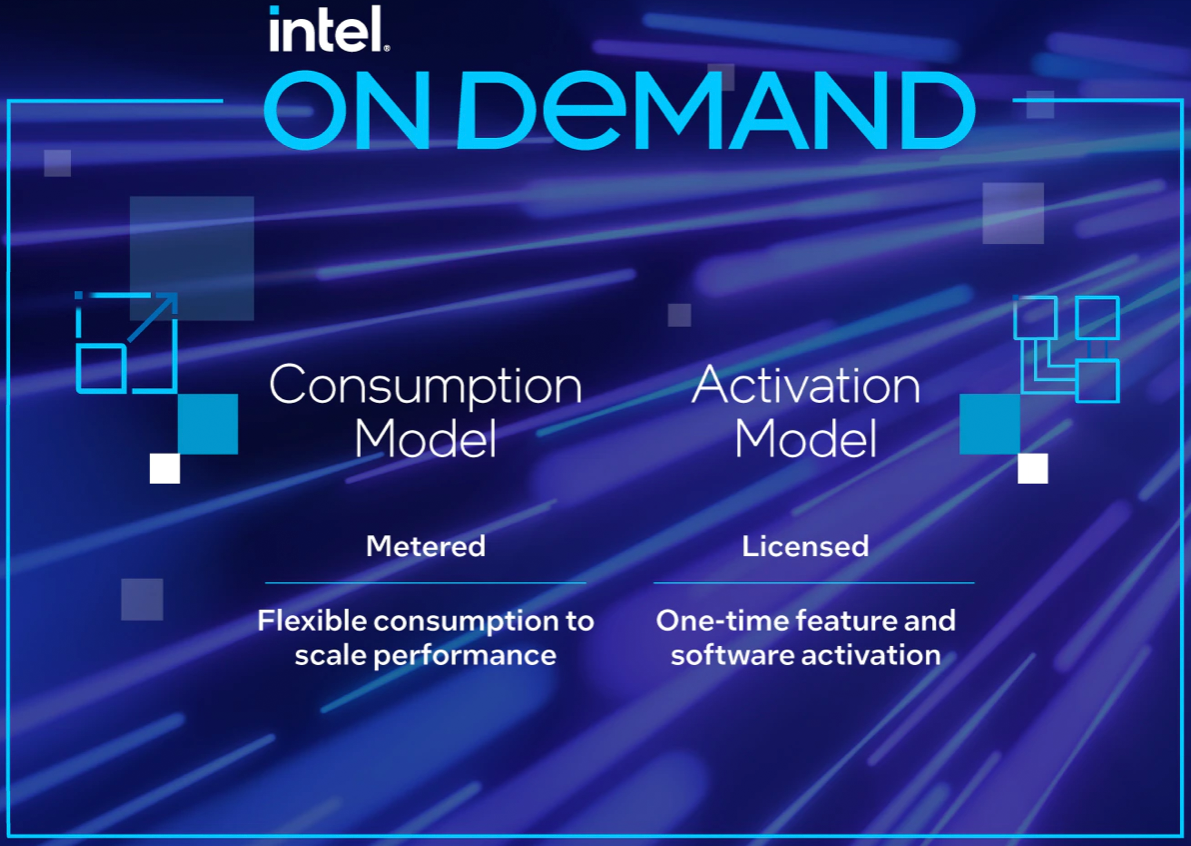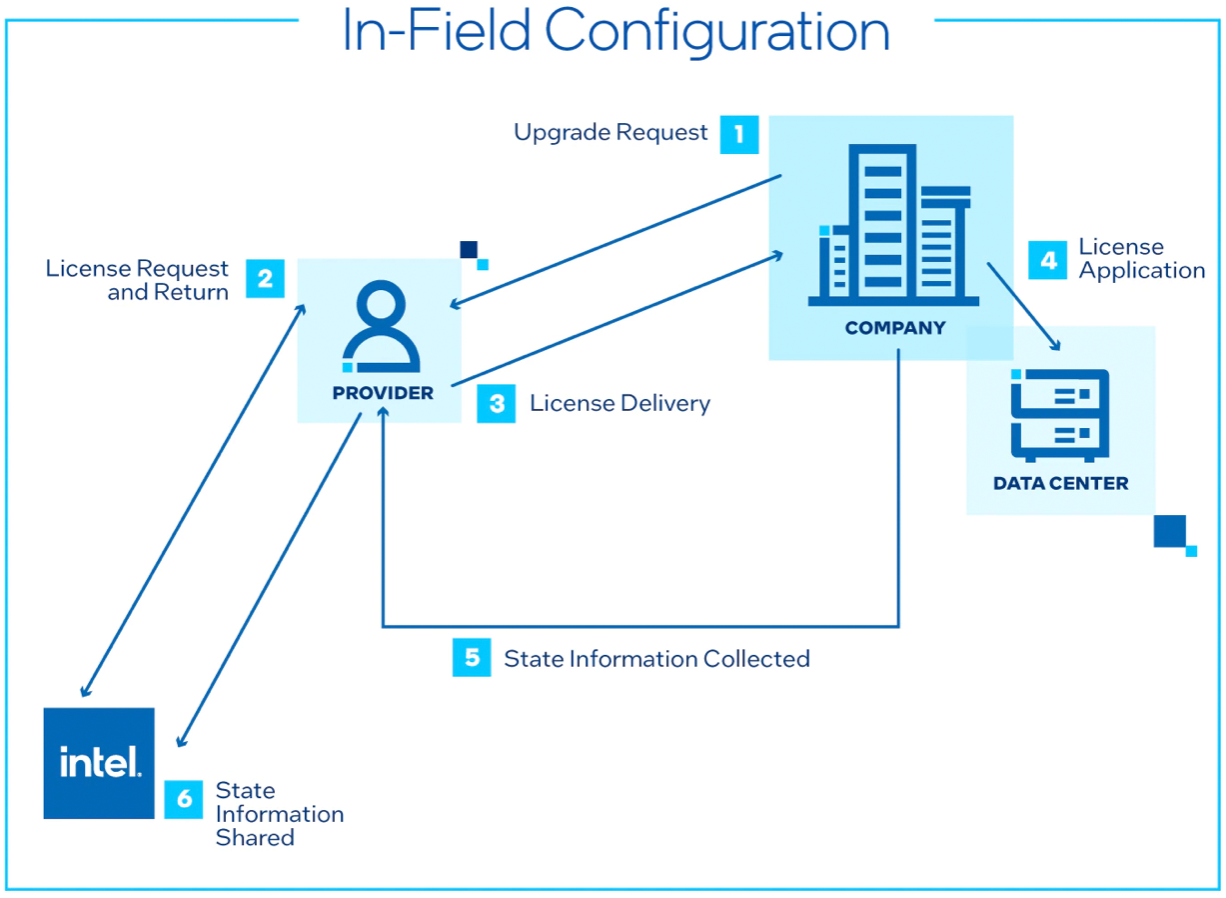Intel Officially Introduces Pay-As-You-Go Chip Licensing
Intel's Xeon Sapphire Rapids CPUs to activate additional features on demand.
Intel has officially revealed its Intel On Demand program that will activate select accelerators and features of the company's upcoming Xeon Scalable Sapphire Rapids processor. The new pay-as-you-go program will allow Intel to reduce the number of SKUs it ships while still capitalizing on the technologies it has to offer. Furthermore, its clients will be able to upgrade their machines without replacing actual hardware or offering additional services to their clients.
Intel's upcoming Intel's 4th Generation Xeon Scalable Sapphire Rapids processors are equipped with various special-purpose accelerators and security technologies that all customers do not need at all times. To offer such end-users additional flexibility regarding investments, Intel will deliver them to buy its CPUs with those capabilities disabled but turn them on if they are needed at some point. The Software Defined Silicon (SDSi) technology will also allow Intel to sell fewer CPU models and then enable its clients or partners to activate certain features if needed (to use them on-prem or offer them as a service).
The list of technologies that Intel wants to make available on demand includes Software Guard Extensions, Dynamic Load Balancer (DLB), Intel Data Streaming Accelerator (DSA), Intel In-Memory Analytics Accelerator (IAA), Intel In-Memory Analytics Accelerator, and Intel QuickAssist Technology (QAT) to accelerate specific workloads.
Since Intel's On Demand technologies are aimed at entirely different workloads, very few customers will need all of them at once. But as they scale their data centers, they may require some of them, which is when the On Demand capability comes into play. Meanwhile, some of Intel's customers will offer those capabilities as a service (e.g., for cloud and co-hosting machines). In contrast, others will contribute to activating them on servers installed on-premise.


The formal rollout of the Intel On Demand program leaves more questions than answers. We do not know how much Intel plans to charge to activate certain features or how much its clients will want to start them 'as a service.' We know that companies like H3C, HPE, Inspur, Lenovo, Supermicro, PhoenixNAP, and Variscale will be a part of the On Demand program.
For now, Intel's On Demand program is reserved for servers, and we would expect it to remain a prerogative of Xeon platforms. Meanwhile, back in the day, Intel offered software upgrades for its desktop processors to make them run faster. Unfortunately, that program faced criticism as Intel essentially crippled its perfectly fine processors. As a result, some might think the On Demand program mimics the ill-fated Intel Upgrade Service. Still, keeping in mind that the server world behaves differently than the client PC world and that we do not know the terms of Intel's On Demand, we would not draw parallels here until we know all the details.
Get Tom's Hardware's best news and in-depth reviews, straight to your inbox.

Anton Shilov is a contributing writer at Tom’s Hardware. Over the past couple of decades, he has covered everything from CPUs and GPUs to supercomputers and from modern process technologies and latest fab tools to high-tech industry trends.
-
Giroro Outrageous greed and an obvious security risk.Reply
I don't often say "this should be illegal", but this should absolutely be illegal. It spits in the face of our basic human right to own the property that we buy.
Imagine buying a car that can disable your steering wheel whenever the car company arbitrarily decides they want more money. -
rluker5 Not that I would want that in my chip at home, but if my town's phone company/local internet provider can save 10k in a year and lose nothing, good for them.Reply
They just have to be clear about it so people know what they are buying. -
DSzymborski ReplyGiroro said:Outrageous greed and an obvious security risk.
I don't often say "this should be illegal", but this should absolutely be illegal. It spits in the face of our basic human right to own the property that we buy.
I'm not sure what legal theory, if any, is being espoused here. Intel's not trying to, unless I'm misreading the article, claw back things they've actually sold. They're offering the option to license you a CPU and if you enter into an agreement to license their property as a condition to obtain use of their property, one can hardly say that you now own it. -
atomicWAR Not a fan of this move. I feel like this is a questionable and potentially damaging (trust wise) buisiness model. My trust certainly feels eroded in Intel. I understand this is all server level silicon but what happens if/when this trickles down to mainstream CPUs? Are we going to own our CPUs in the future or we going to only own a small subset of it functions forced to pay to fully utilize the CPUs we already paid for. A sad day for silicon.Reply -
Lorien Silmaril Intel goes full stupid.Reply
All AMD needs to do to capture all of Intel's server market share is to NOT do this. -
thestryker As long as it's limited to the accelerator units on the CPUs I don't particularly see a problem with this. They're not taking away anything from anyone as most of these haven't been on die before anyways. It is also undoubtedly a better use of company resources to limit the different silicon runs going through the fabs.Reply
This behavior becomes a lot more problematic when they're disabling core parts of the CPU as they did in the past with "unlockable" desktop parts. -
TerryLaze Reply
Imagine buying hundreds of cars and then renting them out for a profit, but now you don't have to buy dozens of different models of cars because you have magic dust that turns any car into a convertible, SUV, 4x4, or whatever people like to rent.Giroro said:Imagine buying a car that can disable your steering wheel whenever the car company arbitrarily decides they want more money.
These CPUs are for providers of server services not for end-users.
https://www.hpe.com/psnow/doc/a00029675enw -
9cento Splendid, now I have to also torrent CPUs. What's next, downloadable RAM? Surely it would be ironicReply -
jkflipflop98 Wow. This is absolute genius. You can pay for exactly what you need, no more and no less.Reply
The rest of you jackwagons "oh Intel is going to take away your CPU cores" don't have a clue what you're talking about. I would suggest reading the article before racing down to the comments to declare something "illegal" before you even understand the situation.